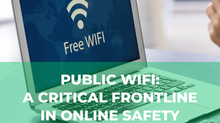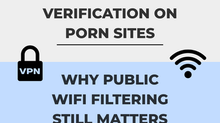Public WiFi: A Critical Frontline in Online Safety
- Friendly WiFi
- Aug 20, 2025
- 3 min read

A major part of where children and young people can be exposed to inappropriate online material is through public spaces — particularly public WiFi. Public WiFi spaces are a major digital access point to the internet, with cafés, trains, shopping centres, and leisure venues all providing open access that can be misused without safeguards in place.
Why the Online Safety Act Alone Isn’t Enough
The UK’s Online Safety Act, which came into force in July 2025, was designed to tackle these risks by tightening protections and introducing age-verification for pornographic websites. We fully acknowledge and support the purpose of this legislation — it has already raised the bar for online safety. But regulation alone is not enough.
Recent reports highlight a surge in VPN use across the UK. According to Proton VPN, UK sign-ups surged by 1,400% in the days following enforcement of the Online Safety Act (Windows Central). While this reflects how quickly young people and adults alike adapt, it reinforces the need for multiple layers of protection — including public WiFi filtering — to reduce exposure where circumvention is not in play.
Filtering: An Essential Safeguard — Not a Silver Bullet
A filtered Public Wi-Fi service plays a crucial role in reducing exposure to harmful material. It ensures that children connecting in cafés, shops, trains, or leisure venues have an extra layer of protection.
That said, filtering is not perfect. Online content evolves daily, and no system can guarantee 100% effectiveness. Filters are regularly updated, but like any technology, they can sometimes block too much or too little. Think of it like carrying an umbrella in the rain: it won’t stop every splash, but it keeps you from getting soaked. Filtering works the same way — it greatly reduces exposure, even if the occasional piece of inappropriate content slips through.
VPNs: Privacy Tools With a Double Edge
VPNs are legitimate and widely used tools for privacy and security. But when employed to bypass age checks, they can undermine protections designed to safeguard children (The Times).
VPNs, while valuable for privacy, can be misused to bypass protections — more like a workaround than a true shield. But even so, in a layered defence approach, every tool plays a role. Filtering solutions can detect and block some known VPN connections, but no technology is infallible
Why the Data Matters
Despite new laws, children’s exposure to pornography remains high. A recent Guardian report found that young people are still encountering adult content online, often unintentionally. This underlines the fact that neither legislation nor technology alone can eliminate the problem — but both, together, can reduce risk significantly.
What Public Wi-Fi Providers Should Ask
If you operate public WiFi, the key questions are:
Does your filtering or network setup cover VPN traffic where possible?
How do you demonstrate to parents and users that your network takes safety seriously?
Are you prepared for continuous updates as technology and evasion methods evolve?
Certification, such as Friendly WiFi, provides independent verification that a network blocks access to child sexual abuse material and pornography. It helps organisations show they meet recognised safety standards and gives parents visible reassurance that protections are in place. Organisations can request more information here.
We also offer help and guidance throughout the process — supporting providers in strengthening their setup, meeting certification requirements, and communicating their commitment to safety with confidence.
Conclusion: A Layered Defence Is the Only Way Forward
The Online Safety Act has driven welcome progress, but legislation alone cannot solve the problem. VPN usage highlights the importance of multi-layered safeguards. Filtering on public WiFi, while not flawless, remains an essential protective measure and a visible demonstration of responsibility.
In the end, it’s about balance. Just as an umbrella doesn’t keep you bone dry but spares you the worst of the storm, effective filtering and confirmation through certification greatly reduce children’s exposure to harmful content. And in the online safety conversation, that reduction makes all the difference.
About Friendly WiFi
Friendly WiFi is the UK Government–initiated certification standard launched in 2014 to help ensure public Wi-Fi services block access to harmful online content, including pornography and child sexual abuse material (CSAM).
Certification provides independent verification that a network meets recognised safety standards, offering reassurance to parents, children, and all users that public Wi-Fi is filtered and safer to use.
Today, the Friendly WiFi symbol is proudly displayed across retail, transport, hospitality, leisure, education, healthcare, and public venues — demonstrating a visible commitment to online safety in the places people connect every day. For media enquiries contact media@rdi-online.co.uk .












































Comments